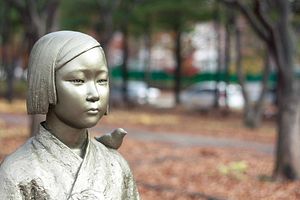On December 28, 2015, Japan and South Korea signed a landmark agreement over the former’s wartime sexual exploitation of Korean “comfort women.” Japan formally apologized and contributed 1 billion yen (about $8.3 million) to compensate the living survivors or the families of the deceased. In return, South Korea would consider the issue settled and dialogue with civic groups to remove a comfort woman statue in front of the Japanese embassy.
The agreement received low public support and fierce resistance from civic groups in South Korea. Activists installed new statutes, including outside the Japanese Consulate in Busan (in January 2017) and in San Francisco (November 2017). On January 4, 2018, recently elected South Korean President Moon Jae-in declared that the agreement “is defective as it not only goes against the principle of truth and justice, but did not reflect the view of the victims.” Although he did not technically void the agreement, Moon repeatedly called for new, more “sincere” apologies from Japan.
The continuing controversy over comfort women is partly rooted in a Manichean worldview that divides people into innocents and oppressors and that lacks awareness of legitimate, alternative viewpoints. In the past, South Koreans were taught that the North Korean regime was a puppet of the Soviet communists, and that contrary views reflected those of communists. Today, South Korean schools and especially media disseminate the activist claim that the Japanese Imperial military abducted 200,000 Korean women and girls, and that views to the contrary reflect those of Japanese right-wingers.
The Japanese government investigated during the 1990s and found no evidence that women from its former colonies (Korea, Taiwan) were forcibly recruited by the Imperial military. (It acknowledged that women from combatant countries, such as China and Indonesia, were illegally abducted by some soldiers and units.) In the award-winning books of professors Sarah Soh (San Francisco State) and Park Yu-ha (Sejong University), women initially offered various testimonies for working at comfort stations, such as supporting their families economically, escaping overbearing parents, or deception by brokers. Some women experienced abusive conditions at comfort stations, others more supportive.
The authors note the complicity of family and neighbors in mobilizing women into brothels, and argue that survivors should freely share their diverse experiences. However, activists pressure survivors to publicly conform to the dominant narrative of Japanese villains and innocent Koreans. For instance, Kim Hak-sun was the first Korean comfort woman to come out publicly and was the model for the San Francisco statue. In her original narrative (given to a representative of the activist Korean Council), Kim reported that her foster father took her and another girl to China, and that he worked as the manager of the local comfort station. In the 1993 published testimony, the Korean Council omitted any mention of her foster father managing the station. Similarly, the original testimony of Lee [Yi] Yong-su said that she and her friend together escaped from home. Later, in her activist role, Lee repeatedly declared that she was abducted by Japanese soldiers in the middle of the night.
The prevailing narrative of abductions is based on the oral testimonies of a small number of women (16 of 238 registered survivors in 1990s), associated with activist organizations (e.g., House of Sharing; Korean Council). A majority of living survivors (34 of 46) accepted the 2015 Japanese compensation, but the media only publicized the rejectionist minority (12). Moreover, the 61 women who accepted Japanese compensation two decades ago (the 1994 Asian Women’s Fund) were vilified as traitors and denied South Korean government subsidies. Park Yu-ha reports, “The late [survivor] Bae Chun-hee said she had not been taken by force, and that she wanted to forgive Japan but could not say so.”
South Korean media rarely discusses the well-documented finding that post-1945 South Korean governments also encouraged and supervised brothels for American soldiers or the allegation that South Korean troops patronized local women in Vietnam. No Korean publisher has translated Soh’s English-language book. A Seoul court partially censored Park’s Korean-language book and fined her 90 million won ($74,000) for defaming survivors; prosecutors requested a three-year prison sentence. A foreign (Korean-American) professor was sharply criticized for discussing the Soh book in his politics courses. The university investigated activist charges that he supported Japanese war crimes, and he was pressured to write a letter of apology.
The censored discourse reflects an underlying, authoritarian-nationalist perspective in which Koreans portray themselves as innocent victims and dissenting voices to the anti-Japanese narrative undermine South Korea’s moral power. An alternative, liberal-nationalist perspective would combine deep love of one’s country with thoughtful, nuanced analysis of a complex past. Censorship undermines the informed citizenry necessary for democratic politics and prudent policymaking. Critical, thoughtful public discourse that transcends simple victimhood narratives would serve both nations’ strategic interests and universal justice.
Joseph Yi is associate professor of political science at Hanyang University (Seoul).

































